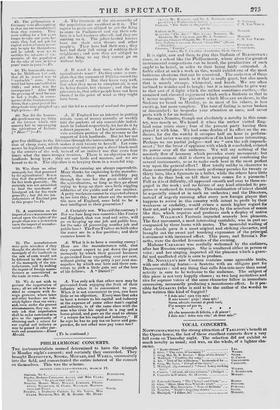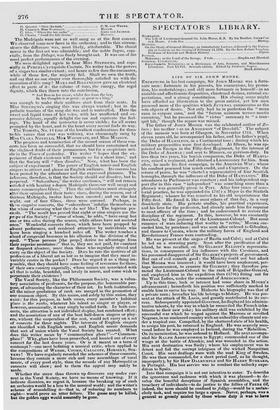VOCAL CONCERTS.
NOTWITHSTANDING the strong attraction of TAGLIONI'S benefit at the Opera-house, the last of these excellent concerts drew a very full room on Thursday night. The selection did not exhibit so much novelty as usual; and was, on the whole, of a lighter cha- 1." Kyrie Adelson t"
2. Glee, " Thy voice, 0 harmony!" W5us.
3. Song. Mrs. II. R. flisumup. " Rose of the desert,"
4. Madrigal, " Cynthia, thy song," G. CROCE. 5. Air, " Bird of the wilderness." harmonized bit GICEATOREI. 6. Song, Mr. SALE. " Friend or the brave.” ICzyccyorn. 7. Madrigal, (by command,) . .'Sv■eet honey-sucking 8. Churns, "All.just, Creator," (Deluge) SCHNEIDER. 9. Concerto in WIWI', MI. HATTON:, MusA,Kr.
10. Trio and Chorus. " The (Though and Crow," BISHOP. 11. Glee. " Blow, blow thou Mintees wind." STEVENS.
12. Cantata, Miss Srseinocs, " Bess of Bedlam," PURCELL.
13. Terzetto, " Night's lingering shades," SPOII R.
14. Madrigal, "1 follow, ho!"
15. Quartet. " Over the dark," C. M. vom Wesel/.
16. Canzouet, Miss VVLODVATT, 17. (11..P, Where the bee sucks." ARNE and J ACE3017.
I. Chorus, Suell the full chorus,"
The Madrigals were not so well sung as at the first concert. We observed some new faces in the orchestra; and to this circum- stance the difference was, most likely, attributable. The choral music in the first act was admirable; and the noble fugue, espe. wially, from the Deluge, was finely brought out. It was one of the most perfect performances of the evening.
We were delighted again to hear Miss STEPHENS, and espe- oially in PURCELL'S exquisite Cantata. No writer tasks the powers -of a singer to a similar extent; and hence so few dare the encounter, while of those few, the majority fail. Shall we own the truth, and say that no one singer ever thoroughly satisfied us with the -execution of this song? MARA and BILLINGTON gave an electrical effect to parts of it : the volume of tone, the energy, the regal dignity, which they threw into the conclusion,
" Awl Bess in her straw, whilst free from the law, In her thoughts is as great—as great as a king,"
was enough to make their auditors start from their seats. In Miss STEPHENS'S singing this was always wanted ; but in the pathetic touches of the song she was and is unrivalled. Here the sweet and liquid tones of her voice, with her unallbcted and ex- pressive delivery, equally delight the ear and captivate the feel- ings. The hand of the instructor is never visible; for all seems prompted by the heart, and to the heart every accent finds its way.
The Terzetto, No. 13 (one of the loveliest combinations for three treble voices that ever was written), was charmingly sung by Miss CLARA NOVELLO, Miss WoonvATT, and Miss MASSON.
The progress and termination of the second season of these con- certs has been so successful, that we should have entertained not the slightest doubt of their permanence, but for a suspicious arti- cle in the Tin/Ps of yesterday. The writer " hopes that the ex- periment of their existence will remain so for a short time," and that the Society will "then dissolve." Now, what has been the subject of experiment ? The power of English music and English singers to attract and please an English audience. Its success has been proved by the attendance and the expressed pleasure. The inference, therefore, is that the Society should not dissolve, but be perpetual. "Subscribers," the writer continues, " will not remain satisfied with hearing a dozen Madrigals (however well sung) and many commonplace Glees." Then the subscribers must strangely alter their opinion and their taste; since, during the season, out of thirteen Madrigals, twelve have been encored ; and on the last night, out of four Glees, three were encored. Perhaps, in th ise singular concerts, the "subscribers" indulge themselves in the whim of encoring what they do not like ! The logician pro- ceeds. "The result has proved that eight or nine singers are the props of the Society ;" "some of whom," he adds, " have sung but one or two solos during the season, while others have not assisted once." Wonderful concerts these, which have been propped by -absent performers, and rendered attractive by individuals who have been singing a hundred miles off. The writer touches a -chord of congenial baseness in his allusion to the division of the spoil. "These persons [the props] derive no advantage from their superior assistance:" that is, they are not paid, for constant or frequent absence, more than those who regularly attend and carry on the object of the Society. Does he rate the motives of all professions of a liberal art so low as to imagine that they must in- variably centre in the pocket ? Does he regard it as a thing im- passible, that they should have some feeling of reverence for those, of their own country especially, whose names are associated with all that is noble, beautiful, and lovely in music, and some wish to perpetuate their existence ? The Vocal Society, like the Philarmonic Society, was a volun- tary association of professors, for the purpose, the honourable pur- pose, of advancing the character of their art. In both institutions, all the minor gradations of rank are merged in the promotion of one common object. By this union, and solely by this union, they exist : for this purpose, in both cases, every member's habitual place is The ranks, whatever his talent as singer or player, or however, occasionally, it may singly be called forth. In both con- certs, the attraction is not individual display, but combined effect; and the association of any of the best half-dozen singers or play- ers, without the cooperation of the rest, would not carry on a set of concerts for three nights. The interests of English singers are identified with English music, and English music demands that sort of union which the Vocal Society has created. What does this writer mean by " commonplace glees ?"—" Common- place!" Why, glees have been proscribed, and hunted out of every concert for the last dozen years. Or is it meant as a term of contempt ?—one most befitting a musical critic, when applied to the compositions of WEBBE, COOKE, CALLCOTT, HORSELY, STE- VENS ! We have regularly recorded the schemes of these concerts, because they contain a more rich and rare assemblage of vocal music, of every good style, than the records of any Metropolitan concerts will show ; and to them the appeal may safely be made.
Whether the straw thus thrown up discovers any under cur- rent in the Vocal Society, we have no means of knowing. If it indicate disunion, we regret it, because the breaking up of such an orchestra would be a loss to the musical world ; and the writer's scheme of remodelling it—that is, of reducing its numbers to eight— would prove an utter failure. The goose may be killed, but the golden eggs would assuredly be gone.





















 Previous page
Previous page